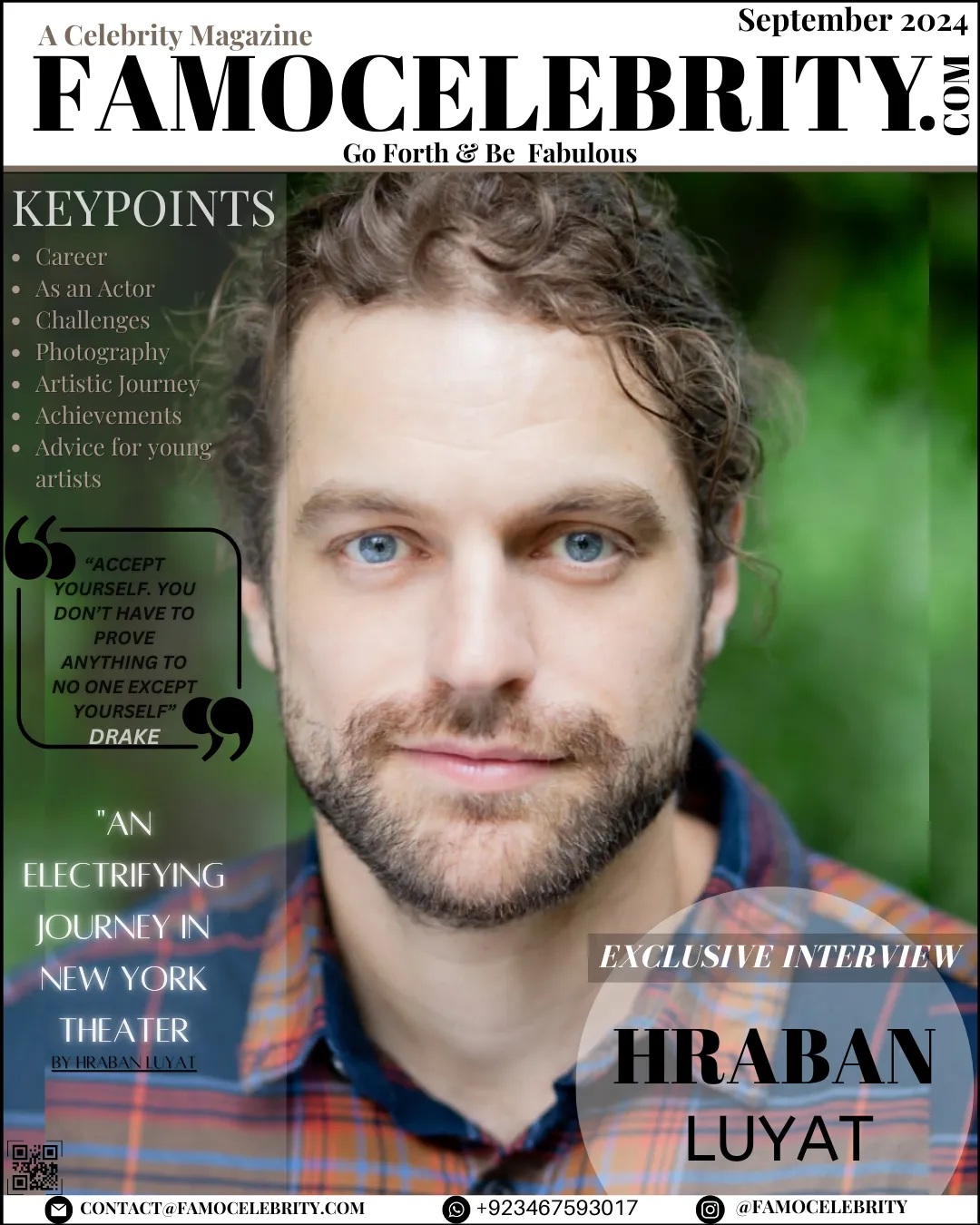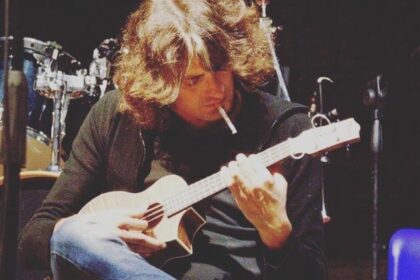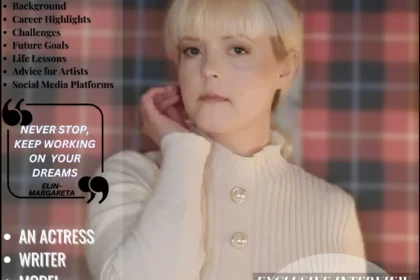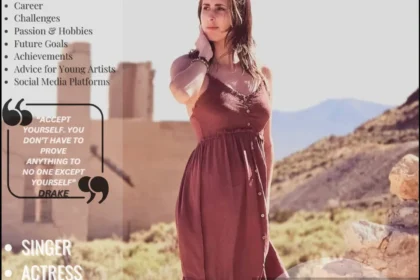If you haven’t heard of Hraban Luyat yet, you’re about to. This Dutch dynamo has taken the New York theater scene by storm, earning a spot as one of New York Today’s Top 3 Classical Actors in 2024. With roots stretching from Holland to France and the UK, Hraban has crafted a career as versatile as it is impressive. After graduating from the prestigious Stella Adler Professional Conservatory, he quickly made his mark in productions like Moscow Moscow Moscow Moscow Moscow Moscow at the newly renovated Herbert Von King Cultural Center, Henry V at the Off-Broadway gem Marjorie S. Deane Little Theatre, Much Ado About Nothing at Caveat, and Girls and Boys at The Tank.
But Hraban’s talents aren’t confined to the stage. He’s also a passionate photographer and a former software developer who swapped code for curtains when he moved to NYC. After
co-founding the experimental theater company Béton Brut with fellow artist Elena Lozonschi, Hraban is gearing up to tackle Eugene Ionesco’s Rhinoceros in the coming year. With a resume that boasts collaborations with renowned artists like Bill Bowers, Celeste Moratti, First Maria ensemble, and the Knickerbocker Players, Hraban shows no signs of slowing down.
Hraban, welcome! What a journey you had so far, and I hear that before fully committing to acting, you had a career in software development. How did that transition happen, and do you find any parallels between the two worlds?
They couldn’t be more different. The market alone: software development is one of the most lopsided labor markets–when I moved to London I sent an email to a mailing list, “hey I’m a software developer I just arrived in London, anyone got a job?” and I got multiple responses. Can you imagine doing that as an actor? “Hey I’m an actor I just moved to New York, anyone wanna cast me?”
And that’s just the beginning. The personality types of the colleagues, the length of an average job, the kind of work, the skills it takes, nothing is the same. Software development is about being one cohesive team working together on a tangible problem for years with a clear measurement of success or failure. Acting is very short-term and nobody is there to tell you if you did it “right”. You just do what you can and people have to accept it.
Maybe there’s one similarity: you spend an inordinate amount of time behind a computer for both jobs. I’ve never sent more emails in my life than as an actor. 90% of the job is doing research and emailing people. If someone had told me that before I started, I would’ve said they were crazy, but here we are.
Photography is another passion of yours. I’m curious on how do you balance this creative outlet with your acting career? Do the two ever intersect in any way?
Yes absolutely! Actually I will say that photography, and all “tech” you find on a set, is probably the clearest intersection of the two fields. I mostly photograph theater and rehearsals, and I’ve found grokking the technical aspects completely seamless, while being a professional actor allows me to know exactly where the action will be, so I know how to be in the right place for a good shot. And it helps you think about framing as an actor, as well. I personally recommend it to every actor and director.
What was so appealing to you about New York that made you take such a leap? How does European theater culture influence you here?
There is a lot of appetite for theater in New York; people are interested in watching every kind of show here; from the most experimental theater to established classics and everything in between. That has huge knock-on effects: you get a large variety of theater companies all vying for their place on the grand stage, and it gives the entire scene a very effervescent character. People are always working on one thing or another, and always ready to take on more work.
What’s wonderful about my time in Europe is there was a slightly stronger connection to the history, to the power of classics in their own right. And the variety of languages and cultures is incredible, so you always have this eclectic mix of influences and experiments right on your doorstep. Especially on the mai land–the UK can be a little conservative but once you get into Europe proper it can get wild.
You’ve had a whirlwind year with standout performances in Moscow Moscow Moscow Moscow Moscow Moscow, Henry V, and Much Ado About Nothing. What has been your favorite role so far, and what did you find most challenging?
You know, I always talk about Henry V and Much Ado, but it’s funny you ask about Moscow Moscow because I feel like I don’t take enough time to appreciate that character [ed: Kulygin]. Playing Kulygin was a blessing in the most unique way. I remember when Masha (the lead producer) originally approached me with the idea, and I had a hard time digesting it; how will I ever live up to him? He seems to be living on this insane level of happiness, unadulterated joy, how will I get on his level? It turns out that A. of course he’s not, he’s hiding, and B. I didn’t need to live “up” to him, I just needed to stop giving in to the parts of me that were keeping him down. There is a little Kulygin in all of us and he’s just waiting to be let out.
Moscow Moscow Moscow Moscow Moscow Moscow was staged at the newly renovated Herbert Von King Cultural Center. What was it like performing in such a historic venue, and how did the space influence your performance?
In a large Proscenium like the Herbert von King voice is everything. They offered us microphones but our director (Joe Goscinski) happened to also be one of the best voice coaches in the country. Obviously, no microphones. I was very happy about it, because it adds to the magic of that venue. It’s a giant theater surrounded by an even bigger park, like a villa from a fairy tale. From the moment you enter the park, you are absorbed in the mystique and charm of the space. And our set designer managed to tie it all together with the most incredible set you’ve ever seen. He’s a legend in his own right (Stephen Phelps–he’s normally on huge movie sets but we were lucky with the strike that he had shifted his attention to theater for a bit), but he truly hit it out of the park with Moscow Moscow.
The venue, the set design, the focus on proper voice technique, it’s rare to have an experience like that where none of those elements are compromised for the sake of money. The art stood front and center.
Much Ado About Nothing is a classic, but performing it at a venue like Caveat, known for its smart, joyfully-nerdy comedy, must have brought a unique twist. How did the venue’s playful, intellectual vibe influence your approach to the production, and what was it like bringing Shakespeare to such a lively and thoughtful stage?
The Caveat is so much fun! I must admit I was worried leading up to opening night–how is this modern audience going to react to such an old play? Turns out my fears were completely unfounded and then some. The production team was very experienced with doing this type of show at this specific venue and they knew exactly what would work and what wouldn’t. The Caveat turned out to be perfect, because it blurs the line between stage and audience. Our director made keen use of that and opened up the stage by placing a lot of action in and around the floor. When that’s done in a regular theater it feels forced and awkward, but at the Caveat it felt very natural. Combined with this incredibly engaged crowd it totally worked. Hats off to the caveat and the team for that!
And by the way; I take issue with the idea that Shakespeare is intellectual. Old, yes. But not intellectual. They’re about as crass and relatable as can be. That’s what makes them survive all those years!
New York Today named you one of the Top 3 Classical Actors of 2024. How does it feel to receive that kind of recognition, and what does it mean to you in terms of your artistic journey?
Honestly quite unreal. Everything I did this year I have the people I worked with to thank for. What I’ve learned over and over again is that the only way to survive in this business is by lifting each other up. They call that the #1 rule in improvisational theater; “your job is to make your partner look good”, but I think it applies to all theater, both on and off stage. This year, a lot of people have done that, and I hope I have done my part, and keep doing that in 2025!
You’ve worked with some incredible talents, like Bill Bowers and Elizabeth Shepherd. How have these collaborations influenced your approach to acting and theater-making?
The most remarkable thing about them, aside from how good they are at what they do of course, is how true they are to themselves. There’s no fakery, no bluff; they really are who they are every day you work with them, and they never pretend to be anything else. It’s a testament
to the power of honesty in theater. I think people inherently resonate with that and on a very instinctual level, I think we as an audience can tell. It’s inspiring to see, that’s for sure.
Now, I don’t think that means I can just stop putting in any work and I’ll end up like Elizabeth Shepherd, in fact quite the opposite: I think it means I will never be like Elizabeth Shepherd no matter what. When you see them, you realize: only they can be that. If you wanna have half a chance at succeeding at anything here, you have to find your own way to do it. So that’s what I’m trying now. It seems to be working for now, but the name of the game is consistency! Let’s see what the next season brings.
Béton Brut, the company you co-founded, is set to produce Rhinoceros next year. What drew you to Ionesco’s absurdist classic, and what can audiences expect from your interpretation?
We have to get some European absurdism to this city! New York is fantastic at Shakespeare and contemporary plays; they’re everywhere, every day, in every shape and form. But I want more absurdism, wilder shows, a show where you have no words to describe what just happened even though you understood everything, and nothing at the same time. That’s Rhinoceros. Ionesco is a master at slowly drawing you into a world where everything is upside down without you noticing anything, until suddenly you wonder “why is tongue hanging on the roof of my mouth?” I love it, and we always need more.
And of course there couldn’t be a better time; everyone is angry at everyone, but we all seem to want the same thing. Rhinoceros is an incredible play about a fundamental change in society, written by a man who lived through that change, and who found a way to talk about it without explicitly saying it.
Finally, for those aspiring international actors out there, what advice would you give to someone looking to break into the world of theater?
Collaborate! All day, every day, with everyone. Particularly in America, people are unbelievably open to collaborating. It’s something in the water here. This isn’t Europe where you have to prove yourself in some insular one-man-show before anyone takes you seriously. Reach out to everyone you know, and to those you don’t know, and stay in touch with them. Ask people what they’re working on, and offer to help. The key to success is working together.




